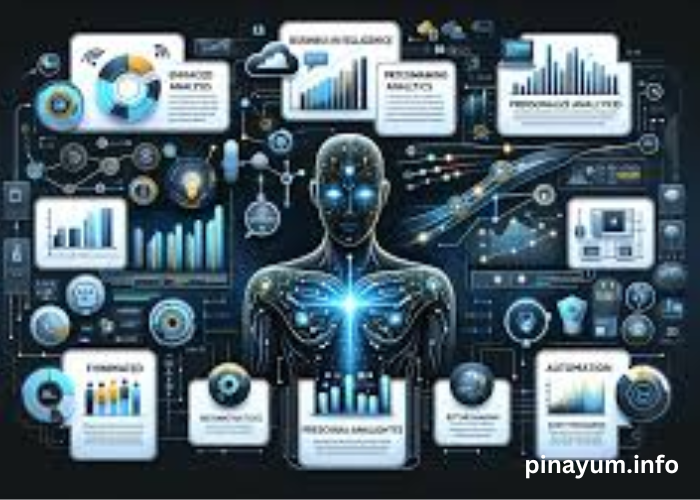Artificial Intelligence (AI) has moved from being a futuristic concept to a powerful force reshaping the way businesses operate. From streamlining operations to enhancing customer experience, AI is driving significant changes in how organizations function across industries. The transformative potential of AI lies in its ability to analyze vast amounts of data, automate repetitive tasks, and offer insights that would be difficult for humans to derive alone. In this article, we explore the AI innovations that are revolutionizing business solutions, providing organizations with tools to optimize processes, improve decision-making, and remain competitive in a rapidly evolving landscape.
1. Introduction: The Impact of AI on Modern Business Solutions
In recent years, AI has become a game-changer in the business world. Its adoption is no longer limited to tech giants and startups; companies across industries, from finance to healthcare, are integrating AI into their operations. The ability of AI to process data quickly, make predictions, and automate tasks allows businesses to focus on more strategic goals while leaving routine work to algorithms.
AI is not just about advanced algorithms or machine learning models; it’s about delivering real-world solutions that improve efficiency, reduce costs, and enhance customer satisfaction. From customer service chatbots to predictive analytics, AI is increasingly becoming an essential tool for business growth.
2. Automation of Routine Tasks: Improving Efficiency and Productivity
One of the most significant ways AI is revolutionizing business solutions is by automating routine and repetitive tasks. For years, businesses have relied on manual processes for data entry, scheduling, and other time-consuming administrative work. AI, with its advanced algorithms, can automate these tasks, saving time and reducing human error.
AI in Business Automation:
- Data Entry and Processing: AI-powered tools can automatically input, process, and categorize data, freeing employees to focus on higher-level tasks.
- Scheduling and Task Management: AI assistants can handle appointment scheduling, meeting coordination, and task reminders, ensuring that teams stay organized without manual intervention.
- Document Management: AI algorithms can categorize, index, and store large volumes of documents, making it easy for businesses to search and retrieve files efficiently.
The integration of AI in automating these processes not only improves productivity but also reduces operational costs, allowing businesses to allocate resources more effectively.
3. Customer Service Transformation: AI-Powered Chatbots and Virtual Assistants
Customer service is one of the most customer-facing aspects of any business. Traditionally, businesses relied on human agents to handle inquiries, process requests, and resolve issues. However, AI-driven solutions are now stepping in to handle customer interactions more efficiently and cost-effectively.
AI Chatbots and Virtual Assistants:
- 24/7 Customer Support: AI chatbots can provide round-the-clock support, ensuring customers can get answers to their questions at any time of day or night.
- Instant Responses: Unlike human agents, AI-powered chatbots can provide immediate responses to customer inquiries, leading to faster resolutions and improved customer satisfaction.
- Personalized Interactions: AI tools can analyze customer data, preferences, and past interactions to offer personalized recommendations and responses, creating a tailored customer experience.
AI-driven customer service solutions are not only helping businesses manage customer expectations but also delivering exceptional service at scale, even during peak times.
4. Predictive Analytics: Enhancing Decision-Making with Data-Driven Insights
In a world where data is constantly being generated, businesses face the challenge of making sense of vast amounts of information. AI-powered predictive analytics is one of the most powerful innovations enabling businesses to turn data into actionable insights. By analyzing historical data, AI models can forecast trends, predict future outcomes, and guide strategic decisions.
How Predictive Analytics Works:
- Sales Forecasting: AI can analyze past sales data to predict future trends, helping businesses plan inventory, optimize marketing strategies, and improve demand forecasting.
- Risk Assessment: AI can predict potential risks, such as financial downturns, supply chain disruptions, or customer churn, allowing businesses to take proactive measures to mitigate these risks.
- Customer Behavior Predictions: By analyzing past behavior, AI can forecast customer preferences, helping businesses tailor their products, services, and marketing efforts.
The use of predictive analytics allows businesses to make informed decisions, reduce uncertainty, and stay ahead of competitors by anticipating market shifts and customer demands.
5. Personalization at Scale: Enhancing Customer Experience
Consumers today expect personalized experiences, whether it’s in marketing, product recommendations, or customer service. AI is transforming how businesses approach personalization by analyzing customer data and delivering tailored experiences at scale.
AI-Powered Personalization:
- Product Recommendations: E-commerce giants like Amazon and Netflix use AI to recommend products and content based on user behavior, preferences, and purchase history, increasing sales and engagement.
- Dynamic Pricing: AI can help businesses adjust pricing in real time based on customer demand, competitor prices, and market trends, optimizing revenue generation.
- Targeted Marketing Campaigns: AI enables businesses to segment their audiences more effectively, ensuring that marketing efforts are tailored to specific demographics and consumer behaviors.
By harnessing AI’s capabilities for personalization, businesses can create more relevant and engaging customer experiences, driving loyalty and increasing customer retention.
6. AI in Human Resources: Streamlining Hiring and Employee Management
AI is also transforming the HR landscape, from streamlining recruitment processes to improving employee retention. With its ability to analyze resumes, assess candidate suitability, and automate administrative tasks, AI is revolutionizing talent management.
AI in Recruitment:
- Resume Screening: AI tools can automatically scan resumes, assess qualifications, and shortlist candidates based on specific job requirements, reducing the time spent on manual screening.
- Interview Automation: AI-powered chatbots and virtual assistants can conduct initial interviews, asking questions and assessing candidates’ responses before human intervention.
- Employee Retention: AI models can analyze employee performance and engagement data to predict which employees might be at risk of leaving, allowing businesses to take proactive steps to improve retention.
By incorporating AI into HR processes, businesses can reduce recruitment costs, improve employee satisfaction, and make data-driven decisions in talent management.
7. AI for Supply Chain Optimization
Supply chain management is critical to the success of many businesses, especially those in retail, manufacturing, and logistics. AI is helping businesses optimize their supply chain operations by analyzing data and predicting potential disruptions.
How AI Optimizes Supply Chains:
- Demand Forecasting: AI can analyze historical sales data and predict future demand, helping businesses manage inventory levels, prevent stockouts, and reduce excess stock.
- Route Optimization: AI-powered tools can determine the most efficient delivery routes for logistics companies, reducing fuel costs and delivery times.
- Supply Chain Risk Management: AI can identify potential risks in the supply chain, such as supplier delays, natural disasters, or geopolitical events, allowing businesses to mitigate these risks in advance.
AI enables businesses to make smarter supply chain decisions, reducing costs, improving efficiency, and enhancing customer satisfaction.
8. AI in Marketing: Revolutionizing Advertising and Content Creation
Marketing has always been a data-driven field, and AI is taking this to the next level. With its ability to analyze consumer behavior and automate content creation, AI is revolutionizing how businesses approach advertising and marketing.
AI in Marketing Strategies:
- Ad Targeting and Campaign Optimization: AI can analyze user data to create hyper-targeted advertising campaigns, ensuring that ads reach the right audience at the right time.
- Content Generation: AI tools can automatically generate content for websites, blogs, and social media, creating engaging and relevant content without human intervention.
- Social Media Monitoring: AI can track brand sentiment across social media platforms, allowing businesses to respond to customer feedback in real time and adjust marketing strategies accordingly.
By integrating AI into marketing efforts, businesses can improve targeting, increase customer engagement, and optimize marketing campaigns for better ROI.
9. AI and Cybersecurity: Strengthening Protection Against Threats
As cyber threats continue to evolve, businesses must adopt advanced technologies to protect sensitive data and maintain customer trust. AI is playing a pivotal role in improving cybersecurity by detecting and responding to threats in real time.
AI in Cybersecurity:
- Threat Detection: AI systems can identify unusual patterns and potential threats, such as phishing attacks, malware, or data breaches, and alert security teams instantly.
- Automated Response: AI can take immediate action to neutralize threats, such as isolating affected systems or blocking malicious IP addresses.
- Continuous Monitoring: AI-powered cybersecurity tools can provide 24/7 monitoring of systems, ensuring that businesses are always protected from evolving threats.
AI enables businesses to stay ahead of cyber threats, providing an extra layer of protection to secure sensitive information and maintain business continuity.
10. AI in Financial Management: Streamlining Operations and Reducing Risk
AI is also making waves in the financial sector by streamlining operations, improving financial forecasting, and reducing risk. From automating transactions to offering real-time financial insights, AI is helping businesses manage their finances more effectively.
AI in Financial Solutions:
- Automated Transactions: AI can automate routine financial transactions, such as invoice processing, reducing errors and improving efficiency.
- Fraud Detection: AI models can analyze transaction data to identify potential fraudulent activities, reducing financial risk for businesses.
- Financial Forecasting: AI tools can provide businesses with real-time financial insights, helping them make data-driven decisions and better plan for the future.
By leveraging AI in financial management, businesses can enhance accuracy, reduce risk, and optimize their financial operations.
11. Conclusion: The Future of AI in Business Solutions
AI is no longer a futuristic concept; it is a present-day reality that is transforming business solutions across industries. From automation and personalized customer experiences to predictive analytics and cybersecurity, AI is reshaping how organizations operate, make decisions, and serve customers. As AI technology continues to evolve, businesses that embrace it will be better positioned to thrive in a competitive marketplace.
For businesses looking to stay ahead of the curve, the key is to embrace AI innovations and integrate them into their operations strategically. With the right AI tools and approaches, businesses can unlock new levels of productivity, customer satisfaction, and profitability. The future of business is AI-powered, and those who adapt to this technological revolution will be well-positioned to lead in their industries.





